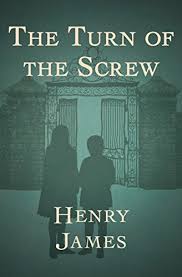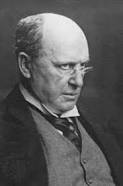The Turn of the Screw Page #4
The Turn of the Screw is an 1898 horror novella by Henry James that first appeared in serial format in Collier's Weekly magazine. In October 1898 it appeared in The Two Magics, a book published by Macmillan in New York City and Heinemann in London.
“Yes; if I do—?” “You will be carried away by the little gentleman!” “Well, that, I think, is what I came for—to be carried away. I’m afraid, however,” I remember feeling the impulse to add, “I’m rather easily carried away. I was carried away in London!” I can still see Mrs. Grose’s broad face as she took this in. “In Harley Street?” “In Harley Street.” “Well, miss, you’re not the first—and you won’t be the last.” “Oh, I’ve no pretension,” I could laugh, “to being the only one. My other pupil, at any rate, as I understand, comes back tomorrow?” “Not tomorrow—Friday, miss. He arrives, as you did, by the coach, under care of the guard, and is to be met by the same carriage.” I forthwith expressed that the proper as well as the pleasant and friendly thing would be therefore that on the arrival of the public conveyance I should be in waiting for him with his little sister; an idea in which Mrs. Grose concurred so heartily that I somehow took her manner as a kind of comforting pledge—never falsified, thank heaven!—that we should on every question be quite at one. Oh, she was glad I was there! What I felt the next day was, I suppose, nothing that could be fairly called a reaction from the cheer of my arrival; it was probably at the most only a slight oppression produced by a fuller measure of the scale, as I walked round them, gazed up at them, took them in, of my new circumstances. They had, as it were, an extent and mass for which I had not been prepared and in the presence of which I found myself, freshly, a little scared as well as a little proud. Lessons, in this agitation, certainly suffered some delay; I reflected that my first duty was, by the gentlest arts I could contrive, to win the child into the sense of knowing me. I spent the day with her out-of-doors; I arranged with her, to her great satisfaction, that it should be she, she only, who might show me the place. She showed it step by step and room by room and secret by secret, with droll, delightful, childish talk about it and with the result, in half an hour, of our becoming immense friends. Young as she was, I was struck, throughout our little tour, with her confidence and courage with the way, in empty chambers and dull corridors, on crooked staircases that made me pause and even on the summit of an old machicolated square tower that made me dizzy, her morning music, her disposition to tell me so many more things than she asked, rang out and led me on. I have not seen Bly since the day I left it, and I daresay that to my older and more informed eyes it would now appear sufficiently contracted. But as my little conductress, with her hair of gold and her frock of blue, danced before me round corners and pattered down passages, I had the view of a castle of romance inhabited by a rosy sprite, such a place as would somehow, for diversion of the young idea, take all color out of storybooks and fairytales. Wasn’t it just a storybook over which I had fallen adoze and adream? No; it was a big, ugly, antique, but convenient house, embodying a few features of a building still older, half-replaced and half-utilized, in which I had the fancy of our being almost as lost as a handful of passengers in a great drifting ship. Well, I was, strangely, at the helm! II This came home to me when, two days later, I drove over with Flora to meet, as Mrs. Grose said, the little gentleman; and all the more for an incident that, presenting itself the second evening, had deeply disconcerted me. The first day had been, on the whole, as I have expressed, reassuring; but I was to see it wind up in keen apprehension. The postbag, that evening—it came late—contained a letter for me, which, however, in the hand of my employer, I found to be composed but of a few words enclosing another, addressed to himself, with a seal still unbroken. “This, I recognize, is from the headmaster, and the headmaster’s an awful bore. Read him, please; deal with him; but mind you don’t report. Not a word. I’m off!” I broke the seal with a great effort—so great a one that I was a long time coming to it; took the unopened missive at last up to my room and only attacked it just before going to bed. I had better have let it wait till morning, for it gave me a second sleepless night. With no counsel to take, the next day, I was full of distress; and it finally got so the better of me that I determined to open myself at least to Mrs. Grose. “What does it mean? The child’s dismissed his school.” She gave me a look that I remarked at the moment; then, visibly, with a quick blankness, seemed to try to take it back. “But aren’t they all—?” “Sent home—yes. But only for the holidays. Miles may never go back at all.” Consciously, under my attention, she reddened. “They won’t take him?” “They absolutely decline.” At this she raised her eyes, which she had turned from me; I saw them fill with good tears. “What has he done?” I hesitated; then I judged best simply to hand her my letter—which, however, had the effect of making her, without taking it, simply put her hands behind her. She shook her head sadly. “Such things are not for me, miss.” My counselor couldn’t read! I winced at my mistake, which I attenuated as I could, and opened my letter again to repeat it to her; then, faltering in the act and folding it up once more, I put it back in my pocket. “Is he really bad?” The tears were still in her eyes. “Do the gentlemen say so?” “They go into no particulars. They simply express their regret that it should be impossible to keep him. That can have only one meaning.” Mrs. Grose listened with dumb emotion; she forbore to ask me what this meaning might be; so that, presently, to put the thing with some coherence and with the mere aid of her presence to my own mind, I went on: “That he’s an injury to the others.” At this, with one of the quick turns of simple folk, she suddenly flamed up. “Master Miles! him an injury?” There was such a flood of good faith in it that, though I had not yet seen the child, my very fears made me jump to the absurdity of the idea. I found myself, to meet my friend the better, offering it, on the spot, sarcastically. “To his poor little innocent mates!” “It’s too dreadful,” cried Mrs. Grose, “to say such cruel things! Why, he’s scarce ten years old.” “Yes, yes; it would be incredible.” She was evidently grateful for such a profession. “See him, miss, first. Then believe it!” I felt forthwith a new impatience to see him; it was the beginning of a curiosity that, for all the next hours, was to deepen almost to pain. Mrs. Grose was aware, I could judge, of what she had produced in me, and she followed it up with assurance. “You might as well believe it of the little lady. Bless her,” she added the next moment—“look at her!” I turned and saw that Flora, whom, ten minutes before, I had established in the schoolroom with a sheet of white paper, a pencil, and a copy of nice “round O’s,” now presented herself to view at the open door. She expressed in her little way an extraordinary detachment from disagreeable duties, looking to me, however, with a great childish light that seemed to offer it as a mere result of the affection she had conceived for my person, which had rendered necessary that she should follow me. I needed nothing more than this to feel the full force of Mrs. Grose’s comparison, and, catching my pupil in my arms, covered her with kisses in which there was a sob of atonement.
Translation
Translate and read this book in other languages:
Select another language:
- - Select -
- 简体中文 (Chinese - Simplified)
- 繁體中文 (Chinese - Traditional)
- Español (Spanish)
- Esperanto (Esperanto)
- 日本語 (Japanese)
- Português (Portuguese)
- Deutsch (German)
- العربية (Arabic)
- Français (French)
- Русский (Russian)
- ಕನ್ನಡ (Kannada)
- 한국어 (Korean)
- עברית (Hebrew)
- Gaeilge (Irish)
- Українська (Ukrainian)
- اردو (Urdu)
- Magyar (Hungarian)
- मानक हिन्दी (Hindi)
- Indonesia (Indonesian)
- Italiano (Italian)
- தமிழ் (Tamil)
- Türkçe (Turkish)
- తెలుగు (Telugu)
- ภาษาไทย (Thai)
- Tiếng Việt (Vietnamese)
- Čeština (Czech)
- Polski (Polish)
- Bahasa Indonesia (Indonesian)
- Românește (Romanian)
- Nederlands (Dutch)
- Ελληνικά (Greek)
- Latinum (Latin)
- Svenska (Swedish)
- Dansk (Danish)
- Suomi (Finnish)
- فارسی (Persian)
- ייִדיש (Yiddish)
- հայերեն (Armenian)
- Norsk (Norwegian)
- English (English)
Citation
Use the citation below to add this book to your bibliography:
Style:MLAChicagoAPA
"The Turn of the Screw Books." Literature.com. STANDS4 LLC, 2025. Web. 8 Mar. 2025. <https://www.literature.com/book/the_turn_of_the_screw_330>.








Discuss this The Turn of the Screw book with the community:
Report Comment
We're doing our best to make sure our content is useful, accurate and safe.
If by any chance you spot an inappropriate comment while navigating through our website please use this form to let us know, and we'll take care of it shortly.
Attachment
You need to be logged in to favorite.
Log In